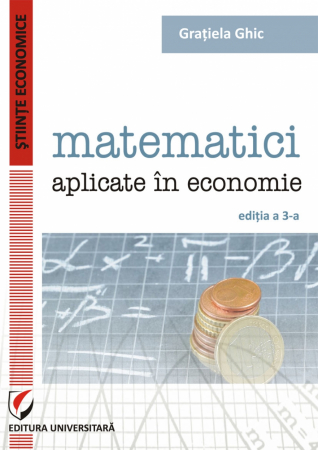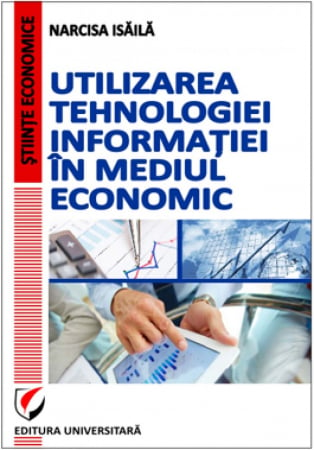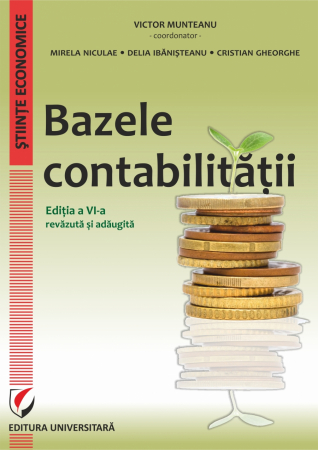Manuscript proposals: [email protected] / 0745 204 115 //// Tracking orders Individuals / Sales: 0745 200 357 / Orders Legal entities: 0721 722 783
Publisher: Editura Universitară
Author: Oana-Claudia Ionescu
ISBN: 978-606-28-0405-3
DOI: 10.5682/9786062804053
Publisher year: 2016
Edition: I
Pages: 156
Product Code:
9786062804053
Do you need help?
0745 200 357
- Description
- Download (1)
- Authors
- Content
- More details
- Reviews (0)
This paper analyzes from a European perspective the concept of social and financial security through the pension system, in the global context of reforming this system, the economic crisis and economic recovery efforts, focusing mainly on the presentation of current characteristics, importance and regulations. as well as performing comparative analyzes and case studies.
The main objective is to perform an analysis as close as possible to the exhaustive nature of the subject, taking into account the results of research undertaken worldwide, but especially those at European and national level, in the current context of Romania as a member country. European Union. At the same time, the paper aims to combine the concerns regarding the theoretical and conceptual presentation of the social security field with the applicative side, represented by determining efficient models of financial planning for retirement, meant to solve the future problems of this system.
The main objective is to perform an analysis as close as possible to the exhaustive nature of the subject, taking into account the results of research undertaken worldwide, but especially those at European and national level, in the current context of Romania as a member country. European Union. At the same time, the paper aims to combine the concerns regarding the theoretical and conceptual presentation of the social security field with the applicative side, represented by determining efficient models of financial planning for retirement, meant to solve the future problems of this system.
-
ASIGURAREA MIXTA DE VIATA - VERSUS PENSIE PRIVATA.CONCEPTE TEORETICE, CERCETARI SI STUDII DE CAZ
Download
OANA-CLAUDIA IONESCU
INTRODUCTION / 7
Chapter I FINANCIAL SECURITY FOR THE ELDERLY - AN APPROACH FROM A EUROPEAN PERSPECTIVE / 14
I.1. Social protection through pension insurance / 16
I.1.1. The evolution of social security systems based on the principle of "insurance" and "universality" / 21
I.1.2. Public versus private social insurance / 26
I.2. Social security and the right to pension in international documents / 29
I.3. The role of the Member States and the European Union in the field of pensions / 39
I.4. The need to reform the pension system in the EU Member States / 43
Chapter II LIFE INSURANCE - PENSION SAVINGS ALTERNATIVE / 53
II.1. The importance of insurance for the European economy. The interaction between the insurance activity, banks and financial markets / 55
II.2. The effects of the economic recession and the influences of the economic crisis on the European insurance market / 60
II.3. European insurance market / 64
II.3.1. The general economic framework of the insurance market and the main European markets / 64
II.3.2. Specific indicators for measuring the insurance market / 71
II.4. SWOT analysis of the private pension market and of the life insurance market / 72
Chapter III. THE EVOLUTION OF THE ROMANIAN PENSION INSURANCE SYSTEM. CURRENT CHARACTERISTICS AND TRENDS OF DEVELOPMENT / 80
III.1. Trends in the development of pension systems and the establishment of the right to a pension. The specificity of the Romanian pension system / 82
III.2. The main objectives in terms of pension. The premises for continuing the reforms / 90
III.3. Methodology of functioning of the Romanian pension system. Imperatives regarding the reform of the pension system / 98
III.4. Estimation model of the individual saving need to allow obtaining an adequate level of the replacement rate through pension - case study / 105
III.4.1. Estimation of the level of salary coverage through compulsory private pension (pillar II) / 106
III.4.2. Calculation of the level of contribution to the voluntary pension (pillar III) in order to complete the estimated gross salary coverage rate / 113
III.4.3. Determining the need to complete the coverage rate through a life insurance with capitalization and guaranteed savings component / 114
III.5. Security and sustainability of the private pension system. Scenarios regarding the situation of the pension system in Romania / 130
FINAL CONSIDERATIONS / 145
BIBLIOGRAPHY / 149
Chapter I FINANCIAL SECURITY FOR THE ELDERLY - AN APPROACH FROM A EUROPEAN PERSPECTIVE / 14
I.1. Social protection through pension insurance / 16
I.1.1. The evolution of social security systems based on the principle of "insurance" and "universality" / 21
I.1.2. Public versus private social insurance / 26
I.2. Social security and the right to pension in international documents / 29
I.3. The role of the Member States and the European Union in the field of pensions / 39
I.4. The need to reform the pension system in the EU Member States / 43
Chapter II LIFE INSURANCE - PENSION SAVINGS ALTERNATIVE / 53
II.1. The importance of insurance for the European economy. The interaction between the insurance activity, banks and financial markets / 55
II.2. The effects of the economic recession and the influences of the economic crisis on the European insurance market / 60
II.3. European insurance market / 64
II.3.1. The general economic framework of the insurance market and the main European markets / 64
II.3.2. Specific indicators for measuring the insurance market / 71
II.4. SWOT analysis of the private pension market and of the life insurance market / 72
Chapter III. THE EVOLUTION OF THE ROMANIAN PENSION INSURANCE SYSTEM. CURRENT CHARACTERISTICS AND TRENDS OF DEVELOPMENT / 80
III.1. Trends in the development of pension systems and the establishment of the right to a pension. The specificity of the Romanian pension system / 82
III.2. The main objectives in terms of pension. The premises for continuing the reforms / 90
III.3. Methodology of functioning of the Romanian pension system. Imperatives regarding the reform of the pension system / 98
III.4. Estimation model of the individual saving need to allow obtaining an adequate level of the replacement rate through pension - case study / 105
III.4.1. Estimation of the level of salary coverage through compulsory private pension (pillar II) / 106
III.4.2. Calculation of the level of contribution to the voluntary pension (pillar III) in order to complete the estimated gross salary coverage rate / 113
III.4.3. Determining the need to complete the coverage rate through a life insurance with capitalization and guaranteed savings component / 114
III.5. Security and sustainability of the private pension system. Scenarios regarding the situation of the pension system in Romania / 130
FINAL CONSIDERATIONS / 145
BIBLIOGRAPHY / 149
This paper addresses the concept and evolution of the pension insurance system from the perspective of the need for sustainability and maintaining an adequate level of future pensions, this issue being intensely debated in national and international scientific circles, very current for the economic and social situation worldwide and with numerous medium and long term implications.
It can be seen that worldwide social security systems have been created to cover the risks of the population regarding unemployment, health, disability, maternity, poverty and longevity and to guarantee unrestricted access to a series of services designed to preserve dignity at of the individual and society. The European Union is certainly a worthy model to follow in terms of social protection and plays an important role in ensuring the organization and financing of these systems but also in achieving effective cooperation by implementing coordination legislation at national level, mainly aimed at ensuring greater good mobility on the labor market. Member States are directly responsible for the level of reform of their pension systems in such a way as to ensure their adequacy but not to compromise the existing financial stability at national level and implicitly at the level of the European Union.
In the current conditions of unprecedented demographic change, ensuring the social protection of the elderly is a challenge for all states of the world. Pension insurance systems face many difficulties that draw attention to the need to ensure their financial viability and sustainability through the implementation of reforms. Over the last 15 years, an increasing number of states have reformed their own pension systems and created new ones, increasingly involving citizens and social partners in ensuring decent pensions by promoting privately managed pre-financed systems. expanding their role in the future. Thus, through the reform, European states must aim as their main objective, ensuring the long-term financial viability of pension systems, in the sense of maintaining within reasonable limits the income obtained at retirement age and preventing poverty and social exclusion of the elderly.
The financial crisis, as well as some financial constraints imposed by the state, had a negative impact on private pension systems and highlighted the shortcomings of the pre-financing process, which further eroded citizens' confidence and once again stressed the need creation and development of sustainable and economically, socially and politically adequate pension systems. The aspects of sustainability and adequacy of pensions are thus inextricably linked, the future adequate pensions presupposing that the pension systems be financed in a sustainable way in the societies subject to a fast aging process. In a 2013 report on the need to reform the pension system, the World Bank considers it appropriate to have a system that is able to provide the entire population with sufficient benefits to prevent poverty and social exclusion of people of retirement age beyond providing means of subsistence meant to ensure a constant consumption, throughout life, of a large majority of the population.
This paper analyzes from a European perspective the concept of social and financial security through the pension system, in the global context of reforming this system, the economic crisis and economic recovery efforts, focusing mainly on the presentation of current characteristics, importance and regulations. as well as performing comparative analyzes and case studies.
The main objective is to perform an analysis as close as possible to the exhaustive nature of the subject, taking into account the results of research undertaken worldwide, but especially those at European and national level, in the current context of Romania as a member country. European Union. At the same time, the paper aims to combine the concerns regarding the theoretical and conceptual presentation of the social security field with the applicative side, represented by determining efficient models of financial planning for retirement, meant to solve the future problems of this system.
It is already known that social protection in the European Union faces many difficulties due to unfavorable demographic trends, economic recession and high unemployment. European Union countries are often put in the position of reforming their own social protection systems, so that they become financially viable but remain efficient in terms of economic. Pursuing the modernization and streamlining of Member States' social protection systems, the Lisbon European Council set out in the "Europe 2020 Strategy" four priority objectives for this area. These objectives take into account: a better integration on the labor market of the elderly, meant to prevent the exclusion of this social category; building safe and sustainable pension systems; creating a medical system that responds to current trends in increasing life expectancy; making work profitable and ensuring an adequate income from work.
The weak economic growth potentiated by the prolonged economic crisis, the deepening of the existing deficits at budgetary level and other causes related to the increase of the indebtedness level that determines the accentuation of the existing financial instability at national level, as well as the decrease of employment, made the systems pensioners can no longer fulfill their promises to ensure an adequate, safe and viable pension. This situation affected both the redistributive pension systems, due to the decrease of the contribution level, and those through capitalization, by reducing the assets of the funds and the returns obtained by them.
The sustainability of redistributive pension funds (PAYG) is increasingly affected by the increase in the rate of economic dependence, as a result of demographic aging, which increasingly emphasizes the need to support the idea of financial planning for pensions, through a mixed system, public and private, occupational and / or individual. Consequently, it is becoming increasingly necessary to develop and implement strategies for the development of this sector. Imbalances in pension systems have often become an important source of fiscal and macroeconomic instability and have hampered economic development and increased fiscal burdens. The main problems facing the pension systems in the Member States of the European Union, such as the aging population, the sustained increase in life expectancy, the retirement of the "baby boom" generation, as well as the continuous decline of the active population, make this perspective the adequacy of pensions can no longer be guaranteed. All these influences will exert a strong pressure on the public finances and will diminish the economic growth potential of the Union states, and the negative economic and budgetary consequences will be unprecedented.
The effect of the implementation of the reforms of the national pension systems will be felt more and more at the level of the entire European economic and monetary union. Therefore, pensions will play a decisive role for Europe's economic and social success, which will be increasingly interested in reducing the risk of transmitting the cross-border consequences of inadequate national social pension policies. Globally, governments in more and more countries have taken important steps toward reforming public pension systems to reduce budget deficits that are becoming increasingly difficult to cover through loans or other sources and reduce transfer rates from wages to pensions. Including Central and Eastern European countries, such as Romania, have managed to make the transition from old bankruptcy systems to increasingly robust and diversified pension systems, immune to political shocks, such as the multi-pillar type, implemented according to the Bank's model. World Cup. Although huge steps have been taken towards expanding these systems, the income base after retirement is still represented by the state pension, which will determine an unsatisfactory standard of living at this age. We can say that, although it has reached its limits, the public pension system must survive in the future. Certainly, the principles that govern redistributive pension systems anywhere in the world can provide favorable results only if the mass of taxpayers is significantly higher than that of current beneficiaries. In the next two or three decades this will no longer be possible, even in countries where this balance is currently maintained at an acceptable level, as the money collected will become increasingly insufficient to cover the need for funds to build decent pensions. The only solution to compensate for this negative trend is to set up private funds, pre-financed from savings made individually in a personal account, with the help of a well-regulated system, which works through specialized administrators. Unfortunately, this is not the case, the predominant tendency of the individual being to cover his current needs with priority and to ignore or even postpone the issue of pensions for future times, possibly more prosperous. This ignorance can also derive from an ignorance of the real situation regarding the perspectives of the public pension system, which can lead to unrealistic expectations and a total lack of personal education in the spirit of saving for old age. This attitude towards the need to save for pensions is not unique for countries with a more recent tradition, these systems proving to be insufficient even in countries with a long tradition of financial services. What differentiates them from these countries is the precarious financial situation, which makes it even more necessary to be concerned about the financial planning of income related to retirement age.
The capacity of the European Union to achieve the two major objectives of the Europe 2020 strategy, that of increasing the employment rate to 75% and reducing the number of those at risk of poverty by at least 20 million people, is influenced the state of implementation of the reforms of the pension systems in the Member States. The need to reform pension systems is also becoming increasingly important in terms of improving Europe's economic growth prospects and is all the more pressing in those countries that are concerned with restoring confidence in public finances. The European Union can add value to these reforms by providing both the regulatory framework through legal rules and funds and tools for coordinating these policies. Thus, the EU develops the main regulations on combating discrimination based on gender and age, provides financial support to support actions to help older people stay in the labor market for as long as possible and makes country-specific recommendations, supporting national governments.
Through the above, we have outlined a small part of the problems facing the current pension system and we have highlighted the importance and timeliness of this topic, which is the subject of this paper. Also, the long experience in teaching and as a specialist in the field of insurance and private pensions, aroused my interest to deepen research in this field, in order to identify the shortcomings of the current pension system and propose directions for action to contribute to improving the performances obtained and ensuring decent pensions for future retirees. The numerous difficulties to which the elderly population will be exposed in an immediate perspective will be unprecedented, if no solutions are found and adequate measures of financial planning and social protection are not applied in due time, which will help to prevent the increase of the level. poverty and social exclusion at retirement age.
It can be seen that worldwide social security systems have been created to cover the risks of the population regarding unemployment, health, disability, maternity, poverty and longevity and to guarantee unrestricted access to a series of services designed to preserve dignity at of the individual and society. The European Union is certainly a worthy model to follow in terms of social protection and plays an important role in ensuring the organization and financing of these systems but also in achieving effective cooperation by implementing coordination legislation at national level, mainly aimed at ensuring greater good mobility on the labor market. Member States are directly responsible for the level of reform of their pension systems in such a way as to ensure their adequacy but not to compromise the existing financial stability at national level and implicitly at the level of the European Union.
In the current conditions of unprecedented demographic change, ensuring the social protection of the elderly is a challenge for all states of the world. Pension insurance systems face many difficulties that draw attention to the need to ensure their financial viability and sustainability through the implementation of reforms. Over the last 15 years, an increasing number of states have reformed their own pension systems and created new ones, increasingly involving citizens and social partners in ensuring decent pensions by promoting privately managed pre-financed systems. expanding their role in the future. Thus, through the reform, European states must aim as their main objective, ensuring the long-term financial viability of pension systems, in the sense of maintaining within reasonable limits the income obtained at retirement age and preventing poverty and social exclusion of the elderly.
The financial crisis, as well as some financial constraints imposed by the state, had a negative impact on private pension systems and highlighted the shortcomings of the pre-financing process, which further eroded citizens' confidence and once again stressed the need creation and development of sustainable and economically, socially and politically adequate pension systems. The aspects of sustainability and adequacy of pensions are thus inextricably linked, the future adequate pensions presupposing that the pension systems be financed in a sustainable way in the societies subject to a fast aging process. In a 2013 report on the need to reform the pension system, the World Bank considers it appropriate to have a system that is able to provide the entire population with sufficient benefits to prevent poverty and social exclusion of people of retirement age beyond providing means of subsistence meant to ensure a constant consumption, throughout life, of a large majority of the population.
This paper analyzes from a European perspective the concept of social and financial security through the pension system, in the global context of reforming this system, the economic crisis and economic recovery efforts, focusing mainly on the presentation of current characteristics, importance and regulations. as well as performing comparative analyzes and case studies.
The main objective is to perform an analysis as close as possible to the exhaustive nature of the subject, taking into account the results of research undertaken worldwide, but especially those at European and national level, in the current context of Romania as a member country. European Union. At the same time, the paper aims to combine the concerns regarding the theoretical and conceptual presentation of the social security field with the applicative side, represented by determining efficient models of financial planning for retirement, meant to solve the future problems of this system.
It is already known that social protection in the European Union faces many difficulties due to unfavorable demographic trends, economic recession and high unemployment. European Union countries are often put in the position of reforming their own social protection systems, so that they become financially viable but remain efficient in terms of economic. Pursuing the modernization and streamlining of Member States' social protection systems, the Lisbon European Council set out in the "Europe 2020 Strategy" four priority objectives for this area. These objectives take into account: a better integration on the labor market of the elderly, meant to prevent the exclusion of this social category; building safe and sustainable pension systems; creating a medical system that responds to current trends in increasing life expectancy; making work profitable and ensuring an adequate income from work.
The weak economic growth potentiated by the prolonged economic crisis, the deepening of the existing deficits at budgetary level and other causes related to the increase of the indebtedness level that determines the accentuation of the existing financial instability at national level, as well as the decrease of employment, made the systems pensioners can no longer fulfill their promises to ensure an adequate, safe and viable pension. This situation affected both the redistributive pension systems, due to the decrease of the contribution level, and those through capitalization, by reducing the assets of the funds and the returns obtained by them.
The sustainability of redistributive pension funds (PAYG) is increasingly affected by the increase in the rate of economic dependence, as a result of demographic aging, which increasingly emphasizes the need to support the idea of financial planning for pensions, through a mixed system, public and private, occupational and / or individual. Consequently, it is becoming increasingly necessary to develop and implement strategies for the development of this sector. Imbalances in pension systems have often become an important source of fiscal and macroeconomic instability and have hampered economic development and increased fiscal burdens. The main problems facing the pension systems in the Member States of the European Union, such as the aging population, the sustained increase in life expectancy, the retirement of the "baby boom" generation, as well as the continuous decline of the active population, make this perspective the adequacy of pensions can no longer be guaranteed. All these influences will exert a strong pressure on the public finances and will diminish the economic growth potential of the Union states, and the negative economic and budgetary consequences will be unprecedented.
The effect of the implementation of the reforms of the national pension systems will be felt more and more at the level of the entire European economic and monetary union. Therefore, pensions will play a decisive role for Europe's economic and social success, which will be increasingly interested in reducing the risk of transmitting the cross-border consequences of inadequate national social pension policies. Globally, governments in more and more countries have taken important steps toward reforming public pension systems to reduce budget deficits that are becoming increasingly difficult to cover through loans or other sources and reduce transfer rates from wages to pensions. Including Central and Eastern European countries, such as Romania, have managed to make the transition from old bankruptcy systems to increasingly robust and diversified pension systems, immune to political shocks, such as the multi-pillar type, implemented according to the Bank's model. World Cup. Although huge steps have been taken towards expanding these systems, the income base after retirement is still represented by the state pension, which will determine an unsatisfactory standard of living at this age. We can say that, although it has reached its limits, the public pension system must survive in the future. Certainly, the principles that govern redistributive pension systems anywhere in the world can provide favorable results only if the mass of taxpayers is significantly higher than that of current beneficiaries. In the next two or three decades this will no longer be possible, even in countries where this balance is currently maintained at an acceptable level, as the money collected will become increasingly insufficient to cover the need for funds to build decent pensions. The only solution to compensate for this negative trend is to set up private funds, pre-financed from savings made individually in a personal account, with the help of a well-regulated system, which works through specialized administrators. Unfortunately, this is not the case, the predominant tendency of the individual being to cover his current needs with priority and to ignore or even postpone the issue of pensions for future times, possibly more prosperous. This ignorance can also derive from an ignorance of the real situation regarding the perspectives of the public pension system, which can lead to unrealistic expectations and a total lack of personal education in the spirit of saving for old age. This attitude towards the need to save for pensions is not unique for countries with a more recent tradition, these systems proving to be insufficient even in countries with a long tradition of financial services. What differentiates them from these countries is the precarious financial situation, which makes it even more necessary to be concerned about the financial planning of income related to retirement age.
The capacity of the European Union to achieve the two major objectives of the Europe 2020 strategy, that of increasing the employment rate to 75% and reducing the number of those at risk of poverty by at least 20 million people, is influenced the state of implementation of the reforms of the pension systems in the Member States. The need to reform pension systems is also becoming increasingly important in terms of improving Europe's economic growth prospects and is all the more pressing in those countries that are concerned with restoring confidence in public finances. The European Union can add value to these reforms by providing both the regulatory framework through legal rules and funds and tools for coordinating these policies. Thus, the EU develops the main regulations on combating discrimination based on gender and age, provides financial support to support actions to help older people stay in the labor market for as long as possible and makes country-specific recommendations, supporting national governments.
Through the above, we have outlined a small part of the problems facing the current pension system and we have highlighted the importance and timeliness of this topic, which is the subject of this paper. Also, the long experience in teaching and as a specialist in the field of insurance and private pensions, aroused my interest to deepen research in this field, in order to identify the shortcomings of the current pension system and propose directions for action to contribute to improving the performances obtained and ensuring decent pensions for future retirees. The numerous difficulties to which the elderly population will be exposed in an immediate perspective will be unprecedented, if no solutions are found and adequate measures of financial planning and social protection are not applied in due time, which will help to prevent the increase of the level. poverty and social exclusion at retirement age.
If you want to express your opinion about this product you can add a review.
write a review

6359.png)
![Mixed life insurance - versus private pension. Theoretical concepts, research and case studies [1] Mixed life insurance - versus private pension. Theoretical concepts, research and case studies [1]](https://gomagcdn.ro/domains/editurauniversitara.ro/files/product/large/asigurarea-mixta-de-viata-versus-pensie-privata-concepte-teoretice-cercetari-si-studii-de-caz-658-225852.jpg)














